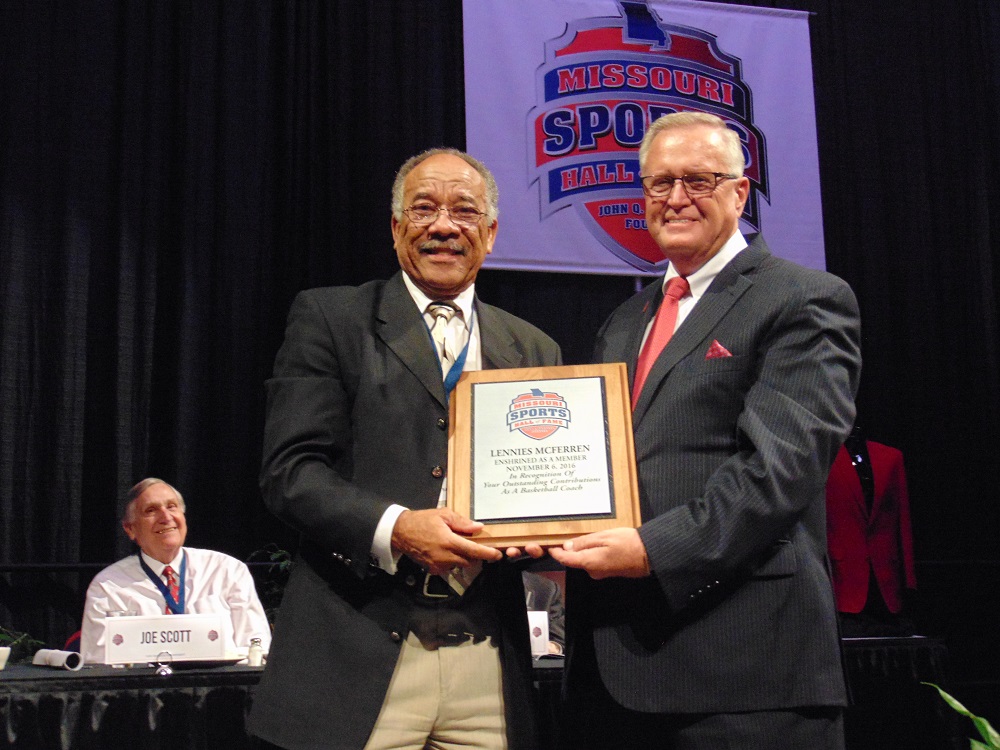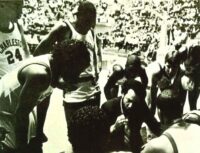Inductees
Lennies McFerren

A coach with nine state championships to his name, who grew up in an era when he and his friends used the rim of a bicycle tire as a basketball goal, believed this: Teaching players life lessons was far more important than winning alone.
“I suffered a few losses just to make a point. That’s just the way it is,” Lennies McFerren said. “I don’t believe in players who don’t do what the coach wants. It’s not a one-man show. It’s about team concept.”
It’s no wonder, then, that McFerren became one of the most respected high school basketball coaches in the state. And for his body of work, the Missouri Sports Hall of Fame is proud to induct McFerren with the Class of 2016.
In essence, between 1977 and 1993 at Charleston High School, a place wedged between Sikeston and the Mississippi River, McFerren won seven state championships (1980, 1983, 1986, 1987, 1989, 1990, 1992). He won two more at New Madrid County Central (2000, 2001) and has come out of retirement twice – at New Madrid Central in 2005 and Kennett High School in November 2016. Overall, he has a 547-184 record in 24 seasons.
When hired at Charleston, McFerren was the first black varsity basketball coach in southeast Missouri. “I was trying to win for everybody – players and players who wanted to get into coaching,” McFerren said.
Despite all the pressure, McFerren balanced discipline with ways to keep the game fun for teenagers.
“When the players walked into the gym, they walked in as a group, and they would leave as a group. If one went to the concession stand during the JV game, they all went,” McFerren said. “Before one game, a few decided to start talking to the ladies. So they didn’t play that night.
“And,” McFerren said, chuckling, “if they could have konked me over the head, they’d done it that game.”
McFerren also was unselfish. Instead of seeking a third consecutive state title with New Madrid, he stepped aside and let good friend Joel Holland coach the team in 2002.
“And I didn’t regret it one bit,” McFerren said. “He meant that much to me.”
McFerren knew what it meant just to be part of the sport.
He was one of 21 children in his family in the community of North Lilbourn near New Madrid. Usually, he and buddies played basketball with the rim of a bicycle tire as the goal and a sock as a ball, because usually they couldn’t afford to buy a basketball. “And the driveway was rock. We didn’t even have concrete to play on,” McFerren said.
McFerren graduated from nearby Howardville in 1966 after earning all-conference his junior and senior years. He then enlisted in the Army the next January at the height of the Vietnam War because, “I didn’t want to sit around and get drafted.” He worked for Uncle Sam for three years and then one year for Wrigley Chewing Gum in Chicago before returning home.
Talk about great timing. McFerren was in a pick-up game that summer when spotted by North Lilbourn coach Ted Mauk who recommended the point guard to then-Three Rivers Community College coach Bob Cradic. However, Cradic was hired by Southeast Missouri State before the season, so McFerren played for coach Gene Bess’ first two teams, earning all-conference.
“I learned the tools of the game from Coach Bess,” McFerren said. “I learned defense. Because in high school, we didn’t know defense existed.”
McFerren graduated from SEMO in 1975 and landed his first coaching job as an assistant to Charleston’s Mitch Haskins. That 1976 team placed second in Class 3, and McFerren was promoted after that season when Haskins accepted a college coaching offer.
In Charleston, James Campbell and Jewell Crawford led the first state championship team. There, McFerren also groomed point guards Tyrone Rodgers, Ricky Jamison, Michael Morris, Carlos McCauley, son Lennies Jr and Cory Frazier and Tim Frazier. The 1990 team finished 33-0 and featured Lamont Frazier and Leonard Corbitt.
New Madrid featured Derrick Tipler, Desmond Sims, Roland Ranson, Brian Murph and Darrell Minner.
As McFerren adjusted to their styles, by either demanding in-your-face defense or a traditional half-court set, they executed. “They took a lot of abuse, because there was a lot of structure,” McFerren said. “But they worked their butts off so I could be successful.”
Assistants also played a huge role. They were Bobby Spencer, Willie Fitzgerald, Ken Schumate and Lennies McFerren Jr.
“We all learned a lot. And we loved each other, and we had some down times,” McFerren said. “But it’s something I’ll never forget.”

